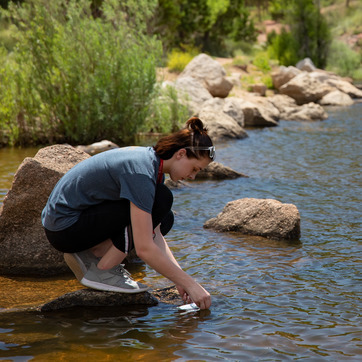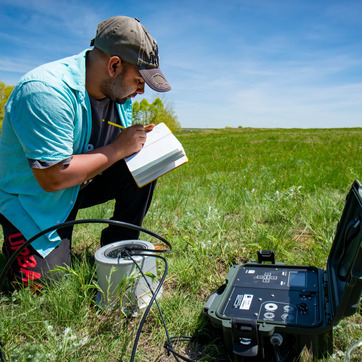Interdisciplinary Dual M.S. Degree Programs in Water Resources (WARE)
The Water Resources (WARE) program is an interdisciplinary Master of Science (MS) dual-degree initiative at the University of Wyoming. It allows students to pursue graduate studies across various departments while conducting MS research. The program promotes flexible academic paths that integrate multiple disciplines, enabling students to tailor their education to their professional goals within the broad field of water resources.
Designed to foster cross-disciplinary education and perspectives, WARE maintains the rigor expected of professionals in water resource fields. While each student is primarily guided by their sponsoring department and major professor, they must also include at least one faculty member from the Hydrologic Science Program on their graduate committee. This faculty member helps shape the students' course selection, academic standards, and research objectives throughout their time in the program.

- Agricultural Economics/Water Resources, M.S. Interdisciplinary
- Botany/Water Resources, M.S. Interdisciplinary
- Civil Engineering/Water Resources, M.S. Interdisciplinary
- Economics/Water Resources M.S. Interdisciplinary
- Entomology/Water Resources, M.S. Interdisciplinary
- Geology/Water Resources, M.S. Interdisciplinary
- Geophysics/Water Resources, M.S. Interdisciplinary
- Rangeland Ecology and Watershed Management/Water Resources, M.S. Interdisciplinary
- Soil Science/Water Resources, M.S. Interdisciplinary
- Zoology and Physiology/Water Resources, M.S. Interdisciplinary
You are encouraged to start by identifying potential degree programs and faculty members with whom you would like to work and contact them directly to further investigate your interests. Please visit the UW Office of Admissions for an overview in the process of applying for graduate studies.
The steps to enroll in the program are to:
-
Work with your committee to create a program of study that fulfills your overall degree requirements and those of the Water Resources program;
-
Send the program of study through your degree channels and the Hydrologic Science Program director; and
-
Fill out a Program Change Form to add the 2nd major of Water Resources (select: "Add a major(s)," and use "other/unknonwn" in the Current Degree/Proposed Degre dropdowns).
Current students: It is not enough to just list the Water Resources option on your Program of Study form. You must also fill out a Program Change Form to add Water Resources as a 2nd major.
Hydrologic Sciences Ph.D.
Serving as the nexus for hydrology scholarship at the University of Wyoming, the program encompasses chemical, physical, and biological components of water systems; dynamic hydrologic processes; climate and weather; human-influenced systems; and data science applications. Our mission is to inspire discovery, develop workforce-ready hydrologists, contribute to solving both basic and applied problems, and provide valuable expertise to public and private stakeholders.
Information and Timeline for Doctoral Degree Students

Link to the progress worksheet.
Students in the WRESE Program are expected to create their graduate committee within the first year of study. The committee should be composed of three faculty members within the PhD program in Hydrology and 2 should be from the student's departmental home. A committee shall be composed of no fewer than 5 members, of which only one may be from outside the University. Additional committee members may be added to support the student's learning and objectives on the discretion of the committee and WRESE Program chair.
Students enrolled in the Program should complete their Program of Study within the first 3 semesters. The student shall work with his/her research advisor and committee to determine the appropriate course of study relative to the student's research agenda. Students are expected to complete a rigorous course of study in quantitative hydrological sciences. Minimum requirements for the PhD include:
- Coursework credits: 42 hours (26 can be from an MS) Total credits: 72 hours
- Math expectations: students are encouraged to pursue a high level of math proficiency, with typical students progressing through differential equations. Individual math expectations will be determined by the committee and program chair.
- A dissertation proposal should be approved by the end of the 4th semester. Students shall submit their proposal to their committee for review two weeks prior to a holding a committee meeting where the student (a) presents their proposal in a public presentation and (b) defends the proposal to the committee in a closed meeting. After the meeting, the student shall amend the proposal as required by the committee within a timely manner.
Advance to candidacy is attained by passing preliminary exams within 3 years of initiating a degree program. Students should complete their preliminary exams as close to the end of their primary coursework as possible. Preliminary exams consist of two parts. The first part is a written examination wherein committee members shall submit written questions to the student. Once the student has passed their written exams, they will be administered an oral examination.
The written exam shall be administered by the student's research adviser, who will
coordinate the questions so as to obtain a comprehensive review of the student's knowledge
of the materials the student has learned in the classroom and needs to complete his/her
research topic. Written questions should cover both conceptual and theoretical underpinnings
in hydrological sciences and technical questions related to the student's research
area.
The written exam will consist of a series of questions as decided upon by the committee
and should take no more than two weeks to complete.
Each committee member shall grade their portion of the exam as pass/fail. The student
shall be viewed as passing the written exam if no more than one person grades their
portion of the exam as failing.
The oral examination will be held no sooner than two weeks after the written exams,
and only after the student has passed their written examinations. The oral exam should
be no less than 90 minutes long and no longer than 3 hours.
Following the exam, each committee member must vote pass/fail. The student will be
deemed as passing if they receive no more than one failing vote.
A dissertation proposal should be approved by the end of the 4th semester. Students shall submit their proposal to their committee for review two weeks prior to a holding a committee meeting where the student (a) presents their proposal in a public presentation and (b) defends the proposal to the committee in a closed meeting. After the meeting, the student shall amend the proposal as required by the committee within a timely manner.
The student will prepare a dissertation and make the document available to the committee
at least two weeks in advance of an oral defense of the document. The oral defense
must be at least 15 weeks after the student has been advanced to candidacy. Students
shall present a public defense to the university community that is expected to be
approximately 45 minutes long, with a public question-and-answer period after the
presentation. If the committee determines that the student has presented a suitable
oral presentation of his/her research findings, a closed session meeting will be held
in which the student defends their research to the committee. At the conclusion of
the defense, each committee member must vote pass/fail. The student will be deemed
as passing if they receive no more than one failing vote.
Students in the WRESE Program may participate from any college, with the expectation that their program of study and dissertation will focus on quantitative issues of hydrological sciences, water resources engineering, law, and/or policy. The Program welcomes academic diversity, and students in WRESE have entered into the Program from a wide range of academic backgrounds and have hailed from numerous home departments, including Ecosystem Science and Management, Civil and Architectural Engineering, Botany, Zoology and Physiology, and Geology and Geophysics.

